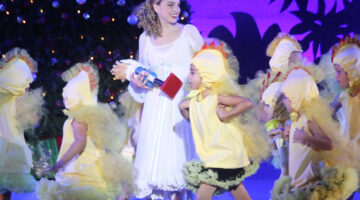The principal languages on our planet today are nine giants shared among one hundred million speakers: Mandarin, Spanish, English, Arabic, Hindi, Bengali, Portuguese, Russian and Japanese.
New Guinea meanwhile, has one thousand of the world’s other seven thousand languages still in use.
Here at Howlings, we too have multiple mavens of language to contend with. For example:
“Get it? Got it? Good,” was not said by Danny Kaye alone in the movie “The Court Jester” as we suggested in last week’s column.
The truth, chides Sheldon Davidson, our king of the correctors, is that this line crops up in dialogue between Kaye (as the minstrel/jester Herbert Hawkins) and Basil Rathbone (as Sir Ravenhurst) with co-star Angela Lansbury as the Princess and Cecil Parker as King Roderick of England in that classic 1956 movie. Here’s the short version.
Hawkins: When do we start?
Ravenhurst: Tonight.
Hawkins: Good. I’d like to get in, get on with it, get it over with, and get out. Get it?
Ravenhurst: Got it.
Hawkins: Good.
Hawkins: The king’s chambers may be the key to the whole plan, get it?
Ravenhurst: Got it.
Hawkins: Good.
Roderick: I trust the jester’s reputation is based on many years of accomplishment?
Hawkins: Why do you think they call me incomparable, sire? Get it?
Roderick: Got it.
Hawkins: Good. (snickers with Roderick)
Princess: It is a miracle! This is the key to the secret passageway…
Hawkins: We leave at midnight. Get it?
Princess: Got it.
Hawkins: Good. Very good.
Ravenhurst: First, are you sure you can dispose of my lords Brockhurst, Finsdale and Pertry?
Hawkins: Are they married?
Ravenhurst: Yes…
Hawkins: Order flowers for the widows. Get it?
Ravenhurst: Got it.
Hawkins: Good. (goes out window) Tally ho! Ho ho!
Today’s various languages all supposedly sprang from way back in Babylon, located in what is today southern Iraq.
The Old Testament’s Book of Revelation describes the city as a cesspit of depravity that included a woman dressed in scarlet sitting on a scarlet beast with letters on her forehead describing her as “Mystery, the mother of prostitutes.” This came after the pre-Christian myth that Babylon was once the center of the world, which in the Book of Genesis boasted a tower where the world’s one language became confused and broken up among the peoples scattered across the Earth (Hebrew for confusion is babel).
The reality was actually the other way around. Babeli was Babylonian for “gateway of the gods” and its tower now recognized as King Nebuchadnezzar’s great ziggurat, or stepped tower.
Alexander the Great wanted to rebuild the ziggurat but only managed to clear the old ruins, located about 50 miles south of modern-day Baghdad — the site most recently of that phrase from the American lexicon: “Shock and Awe.”
In addition to words there are, of course, also foods. And we now know that those foods good for the heart are also good for the brain.
A study published in the Annals of Neurology reported that among 2,258 participants (average age 76), those who closely followed the Mediterranean diet had a 40-percent lower risk of Alzheimer’s disease than those with the least adherence after four years.
The Mediterranean diet means smaller portion sizes than the American diet; a focus on fresh rather than processed foods; a high intake of plant-based foods such as vegetables, fruits, legumes and whole grain; moderate amounts of nuts, olive oil and fish, which are high in monounsaturated and omega-3 fats; moderate consumption of wine, typically with meals; regular consumption of skinless poultry and low-fat dairy in smaller portions; and infrequent consumption of red meat and sweets.
Quote for the Week:
(1919 – 2013)
[livemarket market_name="KONK Life LiveMarket" limit=3 category=“” show_signup=0 show_more=0]




No Comment